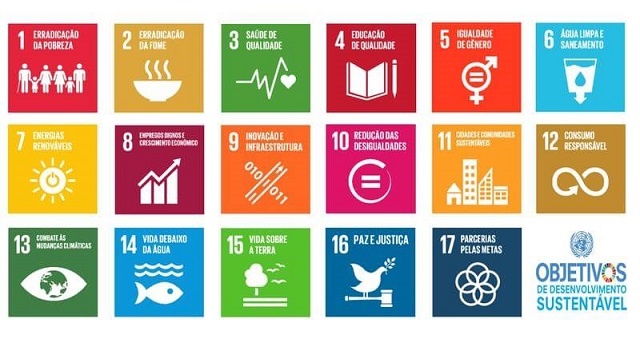Neo Mondo, Pacto Global Rede Brasil, Revista Poder, Plurale - 28/04/2022

By Marketing Team
Posted in May 26, 2022

The movements Mente em Foco, Elas Lideram 2030, +Água, Salário Digno, Raça é Prioridade, Ambição Net Zero and Transparência 100% help accelerate the SDG Agenda
The Brazil Network of the UN Global Compact, the largest corporate sustainability action in the world, announces the launch of Ambition 2030, an initiative composed of seven major Movements, created to accelerate the goals proposed by the UN 2030 Agenda. Achieving the Sustainable Development Goals (SDGs) is a priority and private sector engagement is critical to this. The following Movements are part of the strategy: Mente em Foco, Elas Lideram 2030, +Água, Salário Digno, Raça é Prioridade, Ambição Net Zero and Transparência 100%, which address issues related to health, human rights, climate, access to water and anti-corruption. And on the launch date, at an event attended by 250 CEOs and leaders from the Brazilian private sector, 150 companies had already signed public commitments to the Global Compact initiatives.
The Movements are a call from Rede Brasil do Pacto Global da ONU to the Brazilian companies to recognize the urgency and need to promote concrete actions, with goals and making public commitments. Rede Brasil is a platform for projects and actions that impact society and enhance the commitments assumed through the engagement of leaders in the private sector. Membership is free and companies can join everyone.
“Realizing that everyone has their role and responsibility in this transformation is fundamental. Changing business strategies is crucial and we, as business leaders, are part of the problem, but together we are also the solution”, says Carlo Pereira, Executive Director of the UN Global Compact. “The strategy, through the Movements, will accelerate this transition”.
Rede Brasil is the fastest growing network in the world and has already over 1,500 signatories in the country. In addition to the Movements, the UN Global Compact will also present the 2030 Observatory platform to the public, which will monitor the public commitments assumed by companies.
“We are at a very decisive moment, where our survival is at stake. With the Movements, the Global Compact joins companies to achieve the essential SDGs for Brazil, such as Drinking Water and Sanitation (SDG 6), Reduction of Inequalities (SDG 10) or Action against global climate change (SDG 13), for example. We need, more and more, companies committed to goals and with all the path traced to reach them. There is no point in committing to a goal for 2030 without detailing the actions and strategies to achieve them. We have to make a difference now”, explains Camila Valverde, Impact Director at Rede Brasil.
The Movements are linked to the SDGs. Mente em Foco, which promotes Health and Well-being (SDG 3), invites Brazilian companies and organizations to bring the mental health agenda to the center of decisions, stimulate discussion on the topic, establish concrete actions to support their employees and create a healthy work environment. The goal is for mental health to be treated not only as an emergency measure, but as a perennial issue that is part of the companies’ business strategy.
For Gender Equality (SDG 5), the Elas Lideram 2030 Movement seeks to help companies assume and achieve concrete goals for gender equality, with at least 50% of women in senior leadership positions. The ultimate goal is to have more than 1,500 companies committed, promote 11,000 women to these positions by 2030 and have at least 150 high-level leaders engaged with this ambition.
The issue of water, so debated in Brazil in recent years, also gains a Movement. +Água is an initiative to accelerate the universalization of sanitation and water security in Brazil and has the ambition to impact the lives of more than 100 million people. The definition of goals is seen as a powerful way to boost companies with a competitive advantage in the transformation of society, for the universalization of sanitation and water security in the country, advancing in SDG 6 (Drinking Water and Sanitation).

The Global Compact also invites companies to participate in the Salário Digno Movement, which has the ambition to guarantee 100% living wages for employees, including operations, contractors, and/or outsourced workers, and to engage the entire chain of supplies to develop living wage targets, an essential aspect for promoting guarantees so that workers, their families and communities can live in dignity and have a decent standard of living in pursuit of SDG 8 (Decent work and economic growth).
As part of the quest for Reducing Inequalities (SDG 10), the Raça é Prioridade Movement will work to promote more than 15,000 black people (black, indigenous, quilombola, or belonging to another ethnic minority group) in leadership positions by 2030, more than 20,000 black people trained, with more than 1,500 companies committed to this fundamental issue for Brazil.
The reduction of carbon emissions is one of the main global themes within the 2030 Agenda. And the Ambition Net Zero Movement intends to collaborate for the Reduction of 2 Gigatons of CO2e in accumulated emissions. For this, working locally with greenhouse gas emission reductions is essential to positively impact Brazilian society and the global environment, within the scope of SDG 13 (Action against global climate change).
The issue of fighting corruption is also among the most important for the Brazilian private sector. The 100% Transparency Movement aims to develop effective, accountable and transparent institutions at all levels, encouraging and empowering companies to go beyond legal obligations, strengthening mechanisms of transparency and integrity, within SDG 16 (Peace, Justice and Effective Institutions). ).
The Ambition 2030 launch event was held at Rosewood São Paulo, with support from Ambipar, Zenklub, the Brazilian Institute of Corporate Governance (IBGC) and the International Chamber of Commerce (ICC Brasil), and was attended by over 250 CEOs, shareholders and investors who were able to learn about the UN Global Compact Movements and ambitions until 2030. Ambition 2030 has the support of seven ambassador companies: Instituto Sul-América, Animale, Uber, Aegea, KPMG, Ambipar and Movimento Mulher 360.
Jeffrey Sachs, American economist specializing in sustainable development, Sanda Ojiambo, Global CEO of the UN Global Compact, Silvia Rucks, Resident Coordinator of the UN System in Brazil, Rodolfo Sirol, Chairman of the Board of Directors of Rede Brasil of the UN Global Compact, Pedro Melo, Director General of IBGC, Rachel Maia, Leadership with Impact and Spokesperson for Gender Equality (SDG 5), and Carlo Pereira, Executive Director of the UN Global Compact Network, spoke about the importance of Brazilian private sector engagement with the entire 2030 Agenda and the SDGs.
During the event, the UN Global Compact also presented the Youth Council, formed by Amanda Costa, Beta Boechat, Deives Picaz, Ivan Baron, Monique Evelle, Paloma Costa, Raul Santiago and Txai Suruí. The Youth Council comes to add to the implementation of the strategies of Rede Brasil of the UN Global Compact, with the strength of youth, with diversity, different perspectives and representativeness, and will also support the Board of Directors in recommending priorities and opportunities to accelerate further plus the 2030 Agenda.
“We are the generation that will be most impacted by the decisions and choices you make today. Inclusion cannot just be a pretty speech, it needs to be everyone’s right. We want to build a worthy, inclusive and truly representative future. We, the new generations, will no longer consume what does not represent us, we will not relate to brands where we do not see each other! For a world in constant and accelerating change, diversity is not only desirable, but a strategic advantage. Long-lived companies are diverse, plural and environmentally responsible companies,” they said in a letter read on stage.
Inclusion was also one of the main topics of the night. Rachel Maia, CEO RM Consulting DE& and Leadership with ImPacto, called on the leaders in attendance for greater ambition and accelerating the 2030 Agenda for now.
“There is no plan B planet. There is no Amazon B. Anyone who thinks that sustainability is not profitable is wrong. It is economically profitable. All these social and environmental pillars are profitable. We need to put the SDGs on the table. We need to connect ideas to practice. Sustainable practices that last for a long time, which need to be fully implemented. It’s no use for your company to adopt one or another SDG. We need everyone. I make an appeal. A call for equality! We need to put this topic on the agenda. We need to put women on this agenda. Only through inclusion can we fight this division. Only in this way will we achieve peace. If our dreams don’t scare us, they aren’t big enough.”



